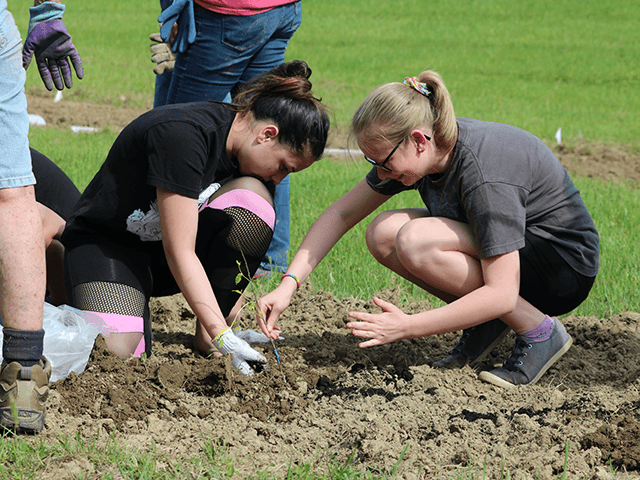
Laudato Sí is a momentous document issued by Pope Francis on climate change. The Laudato Sí Platform Committee presented seven goals for people around the globe to focus on as one way to keep its message before us.
We continue our consideration of these with Goal 5, Ecological Education. (See previous articles for Goals 1-4.)
The Laudato Sí Platform Committee describes Ecological Education as a process of fostering ecological awareness and transformation action in our homes, schools, and communities. It helps us more firmly grasp and acknowledge the interdependence of all living systems. We then can develop a deeper sense of responsibility for the environment and the impact of our actions. This will assist us in incorporating into our daily lives concrete steps to both protect the planet and live sustainably within it.
Some of the actions the Platform Committee suggests are:
- Ensure that members of the community are familiar with the science of the ecological crisis and its social dimensions. (Note: Issues could include “environmental justice”, “sustainable community”, “consumerism” and its affect, “carbon capture”, and “decarbonization”.)
- Research one or two of these. What changes might your new understandings call forth?
- Develop and implement a Laudato Sí education plan.
- Create opportunities for youth-led Laudato Sí projects – and publicly recognize youth for their leadership
- Plant seeds of ecological responsibility in our youth.
- Ensure frequently under-represented groups have access to education.
- Offer culturally appropriate modes of education and/or offer alternative forms of education.
- Ensure members of the community are familiar with the local ecosystem.
Surely an expansive approach.
Let’s step back and ask our ourselves: What does education mean for me? How might my understanding be enhanced by ecological insights gained through Laudato Sí?
Education is about gaining information, learning facts, seeking out a variety of interpretations and experiences, actively and creatively engaging others in a search for better responses and more complete understandings. Education at its best expands one’s perceptions and horizons. It inspires. It has the potential to be transformative.
It has been suggested that Laudato Sí can be used as a tool for transformative learning.
Throughout the encyclical Pope Francis offers guidance and prodding. “The issue of environmental degradation challenges us to reexamine our lifestyle”, he says. (LS 206) We have a “moral imperative of assessing the impact of our every action and personal decision on the world around us.” (LS 208) Francis also writes, “Nobility is the duty to care for creation through little daily actions.” (LS 211)
In a presentation on Ecological Education Erin Brigham, PhD, Executive Director of Joan and Ralph Lane Center for Social Thought and Ignation Tradition, University of San Francisco, spoke of the longings young people have for connection, depth, and purpose. She referred to Chapter 6 in Laudato Sí as offering ways to address these needs. We read there of consumerism with a resulting loss of freedom — and of the need to pursue authentic freedom. She spoke of the importance of reflection and of humility and simplicity in striving for depth and purpose. (See webinar on Ecological Education offered by Catholic Climate Covenant.
These longings are not only those of young people. There is much evidence of such longings in all of us.
Throughout Laudato Sí we find invitations to concrete encounters with nature and with people who offer different insights. This encyclical can serve as a tool for transformative learning — guiding us in ways to address our needs for connection, depth, and purpose.
Another presenter, Sage Lenier, Founder of the nonprofit Sustainable and Just Future, spoke of the importance of people knowing about the issues. She believes that most don’t. She says most educational models use a “scare to care” approach. Rather, the classes she offers discuss a problem for 10 minutes. The rest of the class time is spent proposing solutions that offer hope and a vision forward. It is a Solutions-Oriented Ecological Education.
This communal search for solutions and a sense of hope and vision is evident in Laudato Sí. It does not, however, avoid directly naming the problems and issues that need tending. The integration of all parts of the process is necessary.
Ecological education needs engagement — an emotional dimension that comes from connecting. What experiences and events will be part of your learning that will enable your transformation? What will bring you joy? What will enable you to celebrate?
Suggested actions
- Talk with two or three young people in your family or neighborhood about your recent learnings on ecology and climate change.
- Expand your awareness by talking about ecological issues with people who are culturally different from yourself. Examples of difference: Economic; Geographic; Racial; Physical abilities/disabilities.
